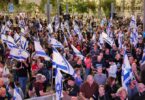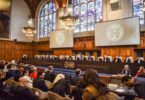Jacob G. Hornberger
I am both fascinated and amused by the fierce reaction among the U.S. mainstream press and American statists to Russia’s invasion of Ukraine. They are all exclaiming how evil the invasion is.
What fascinates and amuses me is that they are totally unable to see that when they identify and confront the evil over there in Ukraine, they are unable to see that they are, at the very same time, accusing their own regime — the U.S. government, specifically the national-security branch of the federal government — of evil.
Why is that? Because the U.S. government, operating through its all-powerful national-security branch, has done everything that Russia is currently doing in Ukraine. The most recent examples are Iraq and Afghanistan, but there are, of course, many more.
In fact, one could easily say that in invading Ukraine, Russia has simply copied the model set forth by the Pentagon and the CIA.
What fascinates and amuses me is how the mainstream press and American statists cannot recognize this. In the midst of their anti-Russia hysteria, it’s as if all the death and destruction that the Pentagon and the CIA unleashed in Iraq and Afghanistan have gone down a memory black hole.
As readers of my blog know, I have a new book out. It’s about the evil within our own midst. Its aim is to encourage Americans to identify and confront evil here at home. As I point out in the book, it’s always easy to identify and confront evil in foreign regimes. We see that phenomenon taking place today with respect to Russia’s invasion of Ukraine. It’s much more difficult, however, to identify and confront evil at home.
The title of my book is An Encounter with Evil: The Abraham Zapruder Story.
Abraham Zapruder was a Dallas businessman who went out to Dealey Plaza in downtown Dallas on November 22, 1963, with his home-movie camera. He proceeded to film the assassination of President John F. Kennedy. As I detail in my book, that event brought Zapruder into contact with evil here at home.
In November 1963, the U.S. government was waging a fierce “Cold War” and anti-communist crusade against Russia (and the Soviet Union, Red China, Cuba, and the rest of the communist world), just as it is today. But even though Zapruder was a Russian immigrant, the evil that he encountered on that fateful day was not Russia (or the Soviet Union, Red China, Cuba, or “godless communism”). The evil he encountered on that fateful day was the evil within his very own government.
How did one 8mm film of the assassination bring Zapruder into contact with evil? Permit me to give you an example, which is detailed much more fully in my new book.
Zapruder’s camera used “double 8” 16mm-wide Kodak film, which would record on two sides of the same film. After the film would be developed, it would be converted into an 8mm film by slitting it down the middle. The two films would then be spliced together end-to-end to make one long 8mm film, which could then be shown in an 8mm home-movie projector.
There is something important to note about this process, as I point out in my new book. Once the 16mm film was slit down the middle, it could not be pasted together to put it back into a 16mm format. Once slit down the middle, it remained an 8mm film.
In the late 1990s, the Assassination Records Review Board took the sworn testimony of a CIA employee named Homer McMahon. He testified that on Sunday night, November 24, 1963, a man identifying himself as Secret Service agent “Bill Smith” secretly brought the Zapruder film from the CIA’s top-secret “Hawkeyeworks” facility at Kodak’s headquarters in Rochester, New York, to the CIA’s National Photographic Interpretation Center (NPIC) in Washington, D.C.
There is something extremely important to note about that film. It was in a 16mm format. That means that it necessarily had to be a copy of the original Zapruder film. Why is that so? Because Zapruder’s film had been slit down the middle by Kodak personnel on the afternoon of the assassination. Since an 8mm film cannot be pasted back together, that necessarily meant that the 16mm Zapruder film on Sunday night had to be a copy.
As in stated in the introduction to my new book, my book revolves around a book entitled Twenty-Six Seconds: A Personal History of the Zapruder Film by Abraham Zapruder’s granddaughter, Alexandra Zapruder. In her book, Alexandra asserts, “The original film seems to have remained unslit.”
Alexandra’s assertion would imply, then, that the 16mm film that was secretly brought to NPIC on Sunday night was the original Zapruder film rather than a copy of the film.
As I detail in my book, however, Alexandra’s assertion flies in the face of the Kodak personnel in Dallas, who expressly stated that they slit the original film and all three copies of the film on the Friday afternoon of the assassination.
Moreover, as I also detail in my book, the Kodak personnel also stated that the copies of the film had a softer tone compared to the original, whose details were sharp and clear. The reason that’s important is that from the very beginning, Abraham Zapruder was determined to get top dollar for his film. The only way he could show his film to prospective buyers is with his 8mm home-movie projector. To get top dollar for his film, he necessarily would have wanted to show prospective buyers the sharply detailed original rather than a softer-toned copy.
On Saturday, November 23, 1963, Zapruder met with LIFE magazine representative Richard Stolley to negotiate the sale of his film. He brought his 8mm movie projector from home and used it to show the film to Stolley at Zapruder’s office. They ultimately arrived at a price of $50,000 for the print-media rights to the film, which is more than $300,000 in today’s dollars. (On Monday, November 25, for reasons I detail in my book, LIFE agreed to purchase all rights to the film, including film rights, for $150,000, which is equivalent to about $1.3 million in today’s dollars.)
As you can imagine, over the years Stolley gave the account of his purchase of the print-media rights to Zapruder’s film many times. His account was always that he watched the Zapruder film, recognized its value, bought the print-media rights, took possession of the original film, and had it flown to Chicago, where LIFE’s printing plant was located. Zapruder’s account of his negotiation with Stolley was always the same as Stolley’s.
Yet, if Kodak had not slit the original film down the middle (as the Kodak personnel said they did), that would have meant that on Saturday morning, Zapruder would have taken both the original 16mm film and an 8mm copy with him when he met with Stolley. He would have shown Stolley the softer-toned 8mm copy on his 8mm home-movie projector and then handed him the unwatched 16mm original.
It goes without saying that that would have been a highly unusual way to handle the purchase and sale of the film, one that inevitably would have been mentioned by either Stolley or Zapruder at some point in their lives, especially since LIFE would have later had to slit the film down the middle to convert it into its 8mm format.
For the rest of their lives, neither Richard Stolley nor Abraham Zapruder ever mentioned such an unusual occurrence. The reason is obvious: The Kodak representatives spoke truthfully when they said that the original film was slit down the middle, and that was the film that Zapruder showed and delivered to Stolley the next morning.
That necessarily means that the 16mm film secretly delivered to the CIA’s NPIC on Sunday had to be a copy of Zapruder’s 8mm film.
As I detail in Chapters 13-17 of my book, Homer McMahon’s testimony before the ARRB is a significant piece to understanding the Kennedy assassination. But it was in the late 2000s that another piece to the Zapruder film mystery came to light, a piece that the CIA had intentionally, knowingly, and deliberately kept secret for some 40 years, including from the Warren Commission, the House Select Committee on Assassinations, and the ARRB. That piece of the puzzle pertained to what happened to the Zapruder film on Saturday night, November 23 — the day after the assassination and the night before the Homer McMahon Sunday-night occurrence.
As I detail in my book, that Saturday-night event, which the CIA had been kept secret for some four decades, is essential to understanding the evil that Dallas businessman Abraham Zapruder encountered on November 22, 1963, an evil here at home that not only destroyed the rest of his life as well as to a Zapruder family taboo against discussing the film that lasted some 50 years. More important, it is an evil that ended up leading our nation toward the deadly, destructive, and highly dangerous trajectory in which we find ourselves today.
You can purchase my new book An Encounter with Evil: The Abraham Zapruder Story at Amazon for $9.95 Kindle version and $14.95 print version. If you find it valuable in terms of how we can get America back on the right road — toward liberty, peace, prosperity, and harmony with the people of the world — please recommend it to others. Also, please don’t forget to leave a rating and review on Amazon.
Courtesy: (fff.org)






